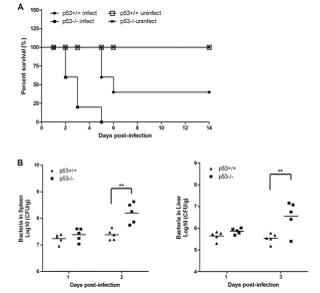
Recently, the Porcine respiratory infectious disease innovation research group led by Prof. Zhiyong Ma at Shanghai Veterinary Research Institute, Chinese Academy of Agricultural Sciences (CAAS) found that Tumor suppressor p53 protects mice against Listeria monocytogenes (LM) infection. This finding was published in the Scientific Reports in September 2016.

The tumor suppressor p53 is involved in the regulation of innate and adaptive immune responses, which plays an antiviral activity. However, whether p53 has anti-bacterial function remains unclear. In the present study, researchers showed that p53 knockout (p53-/-) mice were more susceptible to LM infection, which was manifested by a shorter survival time and lower survival rate. Moreover, LM-infected p53KO mice exhibited severe clinical symptoms and organ injury than the wild-type p53 (p53+/+) mice. p53 plays an essential role in eradicating LM from the spleen and liver. Additional, p53 inhibits LM invasion of RAW264.7 and HeLa cells. Analysis of cytokines showed that p53-deficient mice/cells exhibited impaired IFN-γ, GBP1 and misregulated pro-inflammatory cytokines productions. The combination of these defects likely resulted in the overwhelming LM infection in the p53KO mice. These observations indicate that p53 serves as an important regulator of the host innate immune that protects against LM infection. This study was the first examination of the anti-LM infection functions of p53. Furthermore, it will provide a new insight in the anti-bacteria function of p53, which will increase the understanding of p53 and contribute to the prevention and control of listerosis.
More details are available on the bellow links: http://www.nature.com/articles/srep33815

